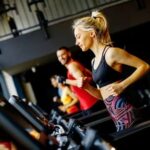Skill-related fitness is a crucial aspect of athletic performance that involves various components such as agility, coordination, speed, power, balance, and reaction time. While these elements are often associated with athletes and their pursuit of excellence in sports, the benefits of skill-related fitness extend far beyond the realm of athletics. In fact, individuals from all walks of life can reap the rewards of enhancing their skill-related fitness.
For athletes, skill-related fitness plays a paramount role in refining their performance in specific sports. The ability to move quickly and effectively react to different situations is fundamental for achieving success on the field or court.
Agility allows athletes to change direction rapidly, while coordination enables them to synchronize movements and maintain precision. Speed helps them outpace opponents, power allows for explosive actions like jumping or throwing, balance ensures stability during dynamic movements, and reaction time enables quick decision-making under pressure.
However, skill-related fitness is not limited to athletes alone. Its advantages can positively impact daily life activities for non-athletes as well. Improved coordination gained through skill-related fitness exercises can make routine tasks easier and more fluid. Enhanced reaction time can be advantageous when driving or participating in emergency situations. By focusing on developing these skills outside of a sporting context, individuals can experience improved performance and overall well-being.
Furthermore, older adults can greatly benefit from skill-related fitness as it contributes to maintaining independence and preventing falls. As we age, declines in agility and balance become more apparent but engaging in exercises targeting skill-related fitness can help mitigate these issues. Additionally, research has shown that regular participation in such activities promotes mental health by increasing self-confidence and reducing stress levels.
Definition of Skill-Related Fitness
Skill-related fitness refers to the physical attributes and abilities that contribute to an individual’s performance in various sports and activities. It encompasses a range of components, including agility, coordination, speed, power, balance, and reaction time. Each of these components plays a crucial role in an athlete’s ability to excel in their chosen discipline.
Agility refers to the ability to change direction quickly and efficiently. It is especially important in sports that require quick changes in direction or sudden stops and starts, such as soccer or basketball. Improved agility can help athletes outmaneuver opponents and react swiftly to game situations.
Coordination involves the integration of multiple body parts and senses to perform movements accurately and smoothly. It is essential for tasks that require precise control, such as dribbling a basketball or executing complex dance moves. Enhancing coordination can result in improved motor skills and overall movement efficiency.
Speed is the ability to move rapidly from one point to another. In sports like track and field or swimming, speed can be the difference between winning and losing. By training speed-related exercises, athletes can develop faster sprinting times or quicker reaction times on the field.
Power is the combination of strength and speed. It is crucial for explosive movements like jumping, throwing, or hitting a baseball. Developing power allows athletes to generate force quickly and efficiently.
Balance refers to an individual’s ability to maintain stability while performing movements. It plays a vital role in various sports and activities, including yoga, gymnastics, or skiing. Improved balance can prevent injuries by enhancing proprioception (awareness of body position) and reducing the risk of falls.
Finally, reaction time is the time it takes for an individual to respond physically or mentally to a stimulus. In sports like tennis or boxing where split-second decisions are vital, having fast reaction times can give athletes a competitive advantage.
Incorporating skill-related fitness components into regular exercise routines can benefit not only athletes but also individuals in everyday life. By improving agility, coordination, speed, power, balance, and reaction time, individuals can enhance their overall physical performance and efficiency in daily activities. Whether it’s navigating through crowded spaces or reacting quickly to prevent accidents while driving, skill-related fitness plays a significant role in ensuring safety and optimal functioning.
Skill-Related Fitness in Athletes
Skill-related fitness plays a crucial role in athletic performance, enabling athletes to excel and achieve their goals in specific sports. This section will explore how athletes heavily rely on skill-related fitness components to enhance their performance and gain a competitive edge.
One of the key components of skill-related fitness is agility. Agility refers to an athlete’s ability to change direction quickly and efficiently while maintaining control over their movements. This skill allows athletes to swiftly navigate through obstacles, evade opponents, and react effectively during fast-paced game situations. For example, basketball players need agility to swiftly maneuver around defenders or catch up with opponents on fast breaks.
Coordination is another essential component of skill-related fitness that athletes rely on. It is the ability to synchronize multiple body parts and movements seamlessly. Good coordination helps athletes maintain balance, timing, and precision in executing complex movements required in various sports. Gymnasts, for instance, must have impeccable coordination to perform intricate routines on different apparatuses.
Speed is also vital for athletes in many sports. It refers to how quickly an individual can move their body or limbs from one point to another. Sprinters depend on speed to win races, while soccer players utilize their speed to outpace opponents and score goals. Speed training exercises assist in developing muscle power and explosiveness, enabling athletes to reach high velocities efficiently.
Skill-Related Fitness for Non-Athletes
Skill-related fitness is not just limited to athletes and sports enthusiasts. In fact, individuals who are not involved in competitive sports can also benefit greatly from improving their skill-related fitness. Skill-related fitness encompasses various components such as agility, coordination, speed, power, balance, and reaction time.
One of the key benefits of skill-related fitness for non-athletes is improved coordination for daily activities. Good coordination allows individuals to move more efficiently and effectively in their day-to-day tasks. It can help with activities such as carrying groceries, climbing stairs, or even playing with children. By enhancing coordination through specific exercises and training, non-athletes can make these activities easier and reduce the risk of injuries.
Enhanced reaction time is another important aspect of skill-related fitness that can have significant benefits for non-athletes. Reaction time refers to how quickly an individual can respond to a stimulus or a sudden event. This skill is crucial in various situations, especially when it comes to driving. Having a faster reaction time can help prevent accidents on the road by allowing individuals to respond swiftly to unexpected events or hazards.
Incorporating skill-related fitness exercises into everyday life doesn’t have to be complicated or time-consuming. Simple activities such as practicing balance exercises while brushing your teeth or incorporating quick agility drills during a workout can make a noticeable difference over time. By making small changes and consistently working on improving these skills, non-athletes can enhance their overall physical abilities and enjoy the benefits of improved coordination and reaction time in their daily lives.
| Benefit | Description |
|---|---|
| Improved Coordination | Enhances efficiency and effectiveness in daily activities |
| Enhanced Reaction Time | Allows individuals to respond quickly to unexpected events or hazards |
Importance of Skill-Related Fitness for Older Adults
As individuals age, maintaining independence and preventing falls become crucial for their overall well-being and quality of life. Skill-related fitness plays a vital role in achieving these goals for older adults. By focusing on agility, coordination, balance, power, and reaction time, skill-related fitness exercises can help improve physical function and reduce the risk of falls among older adults.
One of the primary concerns for older adults is maintaining independence in performing day-to-day activities. Skill-related fitness exercises contribute to this by enhancing essential physical abilities required for daily tasks. For example, improving coordination through targeted exercises can help seniors navigate their environment more efficiently and safely. Enhanced balance can reduce the risk of falls while engaging in various activities like walking or climbing stairs.
Falls are a significant concern for older adults as they can lead to severe injuries and loss of independence. By incorporating skill-related fitness exercises into their routine, older adults can improve their balance and reaction time, which are critical factors in preventing falls.
These exercises focus on strengthening core muscles, improving stability, and enhancing proprioception, all of which play a vital role in maintaining balance and reacting quickly to unexpected situations. With improved skill-related fitness, older adults can feel more confident in their movements and reduce the fear of falling.
Skill-Related Fitness and Mental Health
In addition to its physical benefits, skill-related fitness can also have a profound impact on mental health. Engaging in skill-related fitness activities can increase self-confidence, reduce stress levels, and promote overall well-being.
One way in which skill-related fitness can improve mental health is through the boost in self-confidence that it provides. As individuals enhance their agility, coordination, speed, power, balance, and reaction time through regular practice and training, they develop a sense of mastery over their bodies. This increased confidence in physical abilities can extend to other areas of life as well.
Furthermore, participating in skill-related fitness activities has been shown to be an effective stress-reduction technique. Exercise releases endorphins – also known as “feel-good” hormones – which are natural mood lifters. The focus required to perform skills that involve agility or coordination can also help shift attention away from stressors and promote relaxation.
The positive impact of skill-related fitness on overall well-being is not limited to physical benefits alone. Engaging in regular exercise has been linked to improved sleep quality, increased energy levels, and enhanced cognitive function – all of which contribute to a greater sense of well-being. In fact, research has shown that exercise is just as effective as medication for some individuals with depression or anxiety disorders.
Overall, incorporating skill-related fitness into one’s life can lead to significant improvements in mental health. From the increased self-confidence gained through mastering physical skills to the reduction in stress levels and promotion of overall well-being, skill-related fitness offers numerous advantages beyond its physical aspects. By recognizing the connection between physical activity and mental health, individuals can take steps towards improving both their bodies and minds through skill-related fitness endeavors.
Incorporating Skill-Related Fitness Into Different Exercise Routines
Skill-related fitness is not only important for athletes but also for individuals who want to improve their overall physical abilities and enhance their everyday performance. While athletes heavily rely on skill-related fitness to excel in specific sports, non-athletes can also benefit from incorporating skill-related exercises into their regular workouts or fitness routines.
Identify the Key Components of Skill-Related Fitness
Before incorporating skill-related fitness exercises into your exercise routine, it is crucial to understand the different components of skill-related fitness. These include agility, coordination, speed, power, balance, and reaction time. By focusing on these specific areas, you can target and improve your overall physical abilities.
Incorporate Agility and Balance Exercises
Agility and balance are essential components of skill-related fitness that can be easily incorporated into any exercise routine. One effective way to improve agility is by setting up an obstacle course in your backyard or at a local park. Include cones, hurdles or small obstacles that require quick changes in direction and footwork. Additionally, implementing exercises like single-leg stands or yoga poses that challenge your balance can significantly improve your overall stability.
Include Reaction Time Drills
Enhancing reaction time is beneficial not only for athletes but also for everyday situations where quick responses are necessary. To incorporate reaction time drills into your workout routine, try using a partner or a smartphone app that tests your reflexes. Practice catching a ball thrown by a partner or reacting quickly to audio cues presented by the app. These exercises will help train your brain to react faster in various situations.
By incorporating these skill-related exercises into your regular workouts or fitness routines, you can improve your overall physical abilities while enhancing coordination, reaction time, agility, and balance. Remember to start with manageable exercises and gradually increase the intensity and difficulty as you progress. Skill-related fitness is not limited to athletes; it is a valuable asset that all individuals can benefit from in their everyday lives.
Skill-Related Fitness and Workplace Productivity
Skill-related fitness is not just a concept that applies to athletes; it can also have a profound impact on workplace productivity for individuals in non-athletic settings. While skill-related fitness is often associated with physical abilities such as agility, coordination, and speed, these components can also contribute to improved focus, problem-solving skills, and overall productivity in the workplace.
One way that skill-related fitness can enhance workplace productivity is through improved focus. The ability to concentrate on a task at hand without becoming easily distracted is crucial in any work environment. By regularly engaging in skill-related fitness exercises that require mental focus, individuals can strengthen their ability to stay present and focused on their work tasks. This increased focus can lead to higher efficiency and quality of work output.
In addition to focus, skill-related fitness can also enhance problem-solving skills in the workplace. Agility and coordination exercises that challenge individuals to think quickly and adapt to changing situations can help improve cognitive flexibility and problem-solving abilities. These exercises require individuals to make split-second decisions, analyze information rapidly, and come up with creative solutions – all important skills for effectively navigating challenges in the workplace.
Moreover, incorporating skill-related fitness into one’s regular routine can have an overall positive impact on workplace productivity. Engaging in activities that promote physical health and well-being releases endorphins and reduces stress levels. This reduction in stress allows individuals to approach their work tasks with a clear mind, promoting better decision-making and increasing overall productivity.
Conclusion
In conclusion, skill-related fitness is not just limited to athletes and can benefit individuals from all walks of life. The different components of skill-related fitness, such as agility, coordination, speed, power, balance, and reaction time, play a crucial role in enhancing athletic performance. However, these components also have practical applications in everyday life.
For non-athletes, skill-related fitness can contribute to improved coordination for daily activities and enhanced reaction time for driving. These skills become increasingly important as we age, as they can help older adults maintain their independence, prevent falls, and improve their overall quality of life. Additionally, skill-related fitness can have a positive impact on mental health by increasing self-confidence and reducing stress.
Incorporating skill-related fitness exercises into regular workouts or fitness routines is achievable for individuals of all levels of physical fitness. By doing so, one can reap the benefits of improved focus, problem-solving skills, and overall productivity in the workplace.
Overall, it is important to recognize that skill-related fitness is not exclusive to athletes. Its significance extends far beyond the realm of competitive sports and has the potential to enhance various aspects of our lives. Whether it be through maintaining physical independence as we age or improving mental well-being, skill-related fitness truly has something to offer everyone. Therefore, incorporating skill-related exercises into our daily routines is a valuable investment in our overall health and well-being.
Frequently Asked Questions
Can Others Besides Athletes Benefit From Skill Related Fitness Why?
Yes, skill-related fitness can benefit people beyond athletes. Skill-related fitness is a set of physical attributes that enhance an individual’s ability to perform various athletic activities effectively. These attributes include agility, balance, coordination, power, reaction time, and speed. While these qualities are often associated with sports performance, they are valuable in daily life as well. For example, agility and coordination are essential for tasks such as navigating busy streets or moving quickly in emergency situations.
Likewise, balance and stability contribute to preventing falls and maintaining proper posture. Power and reaction time can aid in reacting swiftly to unexpected events or situations. Speed can improve efficiency in completing daily chores or commuting from one place to another. Therefore, skill-related fitness is not limited to athletes only but can be beneficial for anyone seeking to improve their overall physical capabilities.
Can You Benefit From Skill Related Fitness?
Absolutely! Skill-related fitness is not exclusive to athletes; it can benefit anyone who incorporates it into their exercise routine. While skill-related fitness components are often associated with improving athletic performance, they also enhance the overall quality of life for individuals of all abilities and backgrounds. Agility exercises promote better mobility and flexibility when performing daily activities such as climbing stairs or carrying groceries while maintaining control over body movements. Balance exercises help prevent falls by developing stability and core strength necessary for maintaining equilibrium on uneven surfaces or during sudden changes in movement.
Coordination exercises improve motor skills required for various tasks like hand-eye coordination when playing musical instruments or precision movements needed for hobbies like painting or crafting. Power training enhances explosiveness and strength useful in activities such as lifting heavy objects or pushing furniture while reducing the risk of injury. Reaction time exercises assist in cognitive functioning by sharpening mental processing speed that aids decision-making abilities in fast-paced situations like driving or participating in team sports. Lastly, speed training promotes efficiency by improving cardiovascular health and increasing overall productivity within numerous daily undertakings—from completing household chores more efficiently to engaging in recreational activities with friends and family. Therefore, regardless of one’s athletic pursuits, integrating skill-related fitness into a workout regimen can undoubtedly yield broad-ranging benefits for individuals of all backgrounds and abilities.

Passionate about providing useful information to anyone with an interest in the field of Personal Training, I strive to pass on to our readers quality information and to answer any questions about Personal Trainers, the work they do and how to become one.





